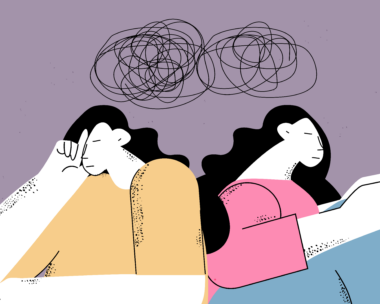The adolescent brain is a strange and wonderful thing.
We tend to think a lot about the impact of what teens are and are not doing – risky behaviour, not wanting to talk or hang out with their parents, and the dreaded ‘peer pressure’ – instead of what is actually going on inside their noggins.
A good place to start might be asking yourself: what do you want your relationship with your kids to be like when they are grown up? And how do you intend to get there?
Teenagers are famous for disconnecting from their parents. In psychology this is called individuating and, much like bankruptcy, it happens very slowly and then all at once, as Ernest Hemingway wrote.
Conceptually, it is something that you want to happen – that is, you want your teenagers to become adults – but in practice, as parents, we often try to stop it happening.
During the teenage years, set up points of connection that allow for a deep and authentic relationship that will remain even when your kids are adults.
This does not mean you need an overwhelming number of conversation threads going with your teen, like some supercharged WhatsApp group. Instead, think of whatever question you ask as a path to conversations and experiences that connect your child back to you.

What do you do to rest?
Self-care. Face masks (the relaxing kind, not the hygienic kind). Bubble baths. Books. Doctors will tell you that rest is essential for mental and physical health. But in our increasingly busy lives, rest is not prioritised.
Busyness has become a marker of status and success, and while ‘selfcare’ is a new buzzword, getting your nails done isn’t going to cut it. We should all be resting every day.
In her book Sacred Rest, Dr Saundra Dalton-Smith talks about the seven types of rest people need. They do not all involve sleep, although seven types of nap does sound ideal to me.
The first type is physical rest: sleeping or napping when your body needs to. It may have been a while since you told your teen to have a nap, and they may have fought the concept of naps when they were younger, but sometimes we do need physical rest.
The second is mental breaks – these are really important for teenagers (and adults), especially when they are studying. Encourage them to break up study routines by going for a walk, staring at the wall (which will rest their eyes as well as their brain), playing a game or listening to music. Your brain needs five to 10 minutes to repair at least every two hours. The same goes for long car drives – rest every two hours.
The third kind of rest is sensory – away from screens, sounds, lights, pings and the dopamine hit of our phones reminding us we are loved and connected.
These breaks do not need to be long or righteous (a seven-day digital detox is my idea of hell), but they do need to be intentional. Deciding to read a book or draw rather than look at a screen is an important break that our brains need.
Emotional rest is one of the most important – it means taking a break from pleasing people. This doesn’t mean being rude to people, but actually stopping to think about what you want to do, how you feel and what you need. That doesn’t mean you’ll get it, of course, but knowing it is the first step.
There’s also creative rest, which could be taking a break when you feel blocked creatively; social rest, which describes time with the people who nourish us; and spiritual rest, which we need to rest our souls.
For some that will involve prayer, for others mindfulness, yoga or meditation. As a parent, you’ll probably read this and think, “Yeah, I know rest is important.” But how did you know, and how will your teen find out? Talk to them about it. Tell them how you rest and ask them how they get the different types of rest they need.
What are your strengths?
I am not one to talk about the gifts of parenting, because I am very honest about parenting being a constant struggle, with some really fun bits thrown in. But if there was one ‘gift’ of parenting, it would be that you see the worst of your kids – that is their gift to you.
They love you and feel safest with you. You are also uniquely placed to see their strengths, and to identify what those strengths are and how your teen can use them.
As parents we love our teens, but that doesn’t mean we always like them. This is where strengths can be really helpful, both for you and for them.
Professor Lea Waters has researched and written about the benefits of strength-based parenting, where you lean on your teen’s strengths to fill the gaps between them (their weaker points, whether it be organisation or patience), rather than focusing on the gaps themselves.
And sometimes those gaps can be blinding, so it requires a conscious decision and practice to do this. To know your teen’s strengths requires you to consider their whole person – what their natural talents and abilities are, as well as who they are and how they act in different situations.
Being argumentative probably means they are able to think critically, but as parents we tend to get caught up in the argument rather than respecting the thought process behind it.
So spend time thinking about your teen’s strengths – perhaps they’re a great friend, so why can’t they use those relationship strengths to be nicer to their brother? Or maybe they’re really organised for sport, so why can’t they organise their wardrobe so items can actually be found?
Or if they are persistent about English homework, how can they use that for science? Look at the strengths they have in some areas, and see if they can be transferred to other areas.
The key benefit of strength-based parenting is that a teenager who knows their strengths, and is reminded of them, will have stronger self-worth, and be more optimistic and resilient.
So although you get to see the worst of your kids, remember: they will only see the best in themselves if you do.
How do you handle disappointment?
It’s important for children to learn how to handle disappointment. Being disappointed about something, be it big or small, is an experience you want your teen to have when they are still at home around loving parents.
You also want your teen to be able to recognise that the disappointment they may be feeling isn’t always ‘worthy’ of disappointment. This helps them gain perspective.
For example, if your teenager’s biggest disappointment in life was not getting the latest iPhone for their birthday, that’s not really an experience that’s going to give them the skills to get through life.
I am not suggesting you create some great tragedy just so your teen can tick the ‘experience disappointment’ box. But when they are faced with disappointment, resist the urge to step in and shield your teen from it.
The most important part of dealing with disappointment is sitting with it. Don’t try to brush it away, or distract your teen from it with something new and shiny, or remind them of everything they have to be grateful for (not yet).
The ability to sit with an uncomfortable emotion is a skill that a lot of adults could do with. I could do with it.
It is an uncomfortable fact that you can’t actually get out of a painful emotion without processing it. Like going on a bear hunt, you have to go through it. Remember, disappointment is an experience we all encounter at some point – many points – but it is one we grow through as well.
Let your teen see you be disappointed sometimes. Explain that this is a day when you will not be going at a million miles an hour, your usual services will not be provided tonight (dinner or homework assistance), that you need tea delivered to you, and that you will be fine in the morning.
Model a healthy relationship with uncomfortable emotions.

What makes a good friend?
Everyone wants their teen to have friends, but it would be naive to suggest that the concept of friendships does not cause parents stress. We worry that our teens will choose the ‘wrong’ friends, or won’t have ‘enough’ friends, or will have ‘too many’ friends, or will ‘only care’ about their friends.
You might have visions of your teen staying friends with the children of the parents you met when they were a baby, but that’s just not how these things work. So let’s look at what you can actually do to be helpful here, because we know teens need peers (in case you are eaten by mammoths and they only have people their own age left).
As a parent, you need to talk to your teen directly about why we need good friends and about whether their friends are fulfilling that need, and encourage your teen to be a good friend to others.
You should be doing two things. The first is asking what they look for in a friend and how they are there for their friends. The second is finding out who they go to.
Be genuinely interested, because these people are going to be in your teen’s life for a while. Ask for names, and look and laugh at photos. Be as included as your teen wants you to be and appreciate they are sharing their new connections with you.
This conversation around who your teen hangs out with will then lead to some further conversations around what makes a healthy friendship and what makes an unhealthy one. Do not back away from these conversations, but rather see them as an opportunity to expand your teen’s social skills.
We can be so focused on keeping relationships that may not be good for us, or may not be good for us forever. Friendships can end or fade away for a multitude of reasons, and while there can be grief in any relationship ending, this is also an opportunity to talk to your teen about what was healthy, or unhealthy, in that relationship.
Learning to develop healthy relationships is often about understanding who we are in those relationships. If you notice your teen is always the friend making the effort, ask them why they think that is. If you notice that they seem to be burning through friends, talk about that as well.
Finally, get them to actually call their friends, or to see them in person. So much confusion happens over text. During lockdown we realised how much more connected we felt after talking on the phone (or dare I say, Zoom), instead of just texting back and forth.
Why is my teenager embarrassed by me?
A friend of mine is the father of a very almost-teenage girl. He told me about the time she wanted to get a hot chocolate with him before school and ducked below the car window on the way there, so no one from school would see her drive past with her dad. Because obviously that would be hideously embarrassing.
He of course had the rational (and slightly rejected) reaction of asking, “So, you want me to buy you a hot chocolate, even though you’re too ashamed to be seen with me?”
I can only imagine the eye rolls that ensued. It can be very upsetting when your teenager doesn’t want to be seen with you or seems embarrassed by you. Or, just hypothetically, when they ask you not to kiss them goodbye any more at school drop-off when they’re only in Year 2. (I’m fine, I’m fine.)
Just because your teen is rejecting you, though, doesn’t mean you reject them back. There is no ghosting in parenting. You have to be the bigger person, even if they are taller than you (really, I’m fine).
Psychologist Dr Lisa Damour talks about teens, especially teenage girls, doing this and how it can be particularly upsetting for fathers.
This is for the obvious and excellent reason that their mothers have actually been teenage girls. They see the process their daughters go through from the perspective of someone who has been through it and come out fine.
Dads are really important here. When dads don’t persevere with their teens, especially their daughters, this can lead to, er, ‘daddy issues’. And let’s not pretend that they don’t exist for sons as well. I mean, Oedipus is quite the complex.
This is where being a lighthouse parent is so important – there, constant, safe. At St Catherine’s School in Sydney, we do surveys on student wellbeing, and this is what they consistently show: the first relationship to take a hit as your teenager individuates is the one with their parents.
The second is with their teachers, and, finally, their friends. And then they reconcile in the opposite order – friends, teachers, parents. In other words, you get the worst of your teen for the longest.
So, embrace how embarrassing you are. How unwoke, cringe-worthy and annoying you are. Know it is your constant love and support that will ensure they get through it, and that you come out the other side with a good relationship.
And one day, they’ll be happy to walk down the street with you, past their peers. They might even buy you a hot chocolate.
This is an edited extract from 50 Questions to Ask Your Teens by Daisy Turnbull, published by Hardie Grant Books. Purchase 50 Questions to Ask Your Teens from either Booktopia or Dymocks.




